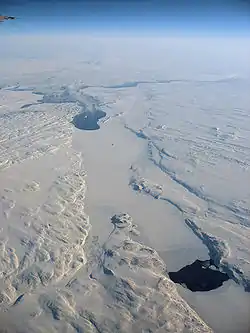Arnaud River
The Arnaud River (formerly known as the Payne River) is a river in Nunavik, Quebec, Canada, flowing from the low plateaux of the Ungava Peninsula through a series of glacial lakes to Ungava Bay. Its mean discharge is approximately 15 km³ per year, but the river flows only in the summer as it is frozen to several metres for the rest of the year. The total length of the river is about 377 kilometres, but there are several main channels in the upper reaches of the river, most of them unnamed and hardly sighted even by the native Inuit.
| Arnaud River Rivière Arnaud | |
|---|---|
 Payne Bay and mouth of the Arnaud River. Kangirsuk is faintly visible on the north (left) shore. | |
| Location | |
| Country | Canada |
| Province | Quebec |
| Region | Nunavik |
| Physical characteristics | |
| Source | Payne Lake |
| Mouth | Ungava Bay |
• coordinates | 59°58′55″N 69°45′31″W[1] |
| Length | 377 km (234 mi)[2] |
| Basin size | 49,500 km2 (19,100 sq mi)[2] |
| Discharge | |
| • average | 670 m3/s (24,000 cu ft/s)[2] |
The Inuit village of Kangirsuk lies near the mouth of the Arnaud River on the north shore of Payne Bay, 13 kilometres (8.1 mi) inland from the western coast of Ungava Bay. About 22 kilometres (14 mi) upstream from Kangirsuk is the Hammer of Thor archaeological site.
Most of the basin is almost totally barren owing to the harsh climate - the mean temperature is only about 7 °C (45 °F) even at the height of summer and continuous permafrost extends deep from only half a metre below the surface. The only vegetation is low shrubs at the lower levels, for no trees grow within the Arnaud basin even in the most sheltered sites, and the river freezes for too long to make hydroelectric development feasible.
Gallery
 Payne River at Kangirsuk
Payne River at Kangirsuk_(2241).jpg.webp) Inuit Encampment, Payne River (Arnaud) (2241)
Inuit Encampment, Payne River (Arnaud) (2241)
References
- "Rivière Arnaud". Geographical Names Data Base. Natural Resources Canada. Retrieved 2010-11-24.
- "Other Rivers Flowing Into the Atlantic Ocean". The National Atlas of Canada, 5th edition. Natural Resources Canada. 1985. Archived from the original on 2008-01-25. Retrieved 2012-09-27.
| Wikimedia Commons has media related to Rivière Arnaud. |